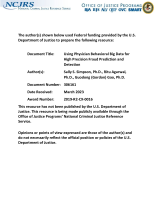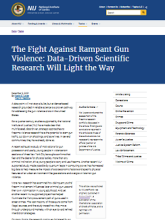Federal Law Enforcement
Organizational Transformation of a Federal Education Program Reflections on LEEP (Law Enforcement Educational Program)
Support Activities under Section 13(d) of Executive Order 14074: Workshops on Law Enforcement Use of Probabilistic DNA Technologies and Person-based Predictive Policing
What Works in De-Escalation Training
Using Physician Behavioral Big Data for High Precision Fraud Prediction and Detection
Tribal Crime, Justice, and Safety, Part 1
Research indicates that Native American persons experience crime victimization at higher rates than non-Native people. Furthermore, the unique position of American Indian and Alaska Native tribes as both sovereign nations and domestic dependents of the U.S. creates jurisdictional complexities in responding to crime, justice, and safety. Senior social and behavioral scientist Christine (Tina) Crossland discusses NIJ’s research on these topics, especially on the prevention of violence towards American Indians and Alaska Natives. Communications Assistant Stacy Lee Reynolds hosts.
Booker and Beyond Analyzing Sentencing Reform and Exploring New Research Directions
This webinar features a discussion of previously published research on the U.S. Supreme Court’s 2005 Booker decision - which effectively transformed the United States Sentencing Guidelines from a mandatory, to an advisory, system. The presentation will address selected research findings from the last 15 years. Individual participants will briefly review their previous research findings with particular attention paid to the analytic methods used.
See the YouTube Terms of Service and Google Privacy Policy
Multilevel Evaluation of Project Safe Neighborhoods
Project Safe Neighborhoods (PSN) is a DOJ-sponsored initiative to reduce violent crime, particularly gun crime, by fostering cooperation by criminal justice agencies and local partners to develop and implement strategic approaches.
See the YouTube Terms of Service and Google Privacy Policy
The Fight Against Rampant Gun Violence: Data-Driven Scientific Research Will Light the Way
Engaging With Communities To Prevent Violent Extremism: A Review of the Obama Administration's CVE Initiative, Executive Summary
Engaging With Communities To Prevent Violent Extremism: A Review of the Obama Administration's CVE Initiative, Final Report
A Century of Changing Boundaries
The Changing Boundaries Between Federal and Local Law Enforcement
Getting a 'TIP,' Making a 'Linc'
Boys and Girls Clubs in Public Housing, Final Research Report
Thinking About Crime: A Federal Perspective on a Local Issue
Violence Against American Indian and Alaska Native Women and Men - 2010 Findings from the National Intimate Partner and Sexual Violence Survey
This seminar provides the first set of estimates from a national large-scale survey of violence against women and men who identified themselves as American Indian or Alaska Native using detailed behaviorally specific questions on psychological aggression, coercive control and entrapment, physical violence, stalking, and sexual violence. These results are expected to raise awareness and understanding of violence experienced by American Indian and Alaska Native people.
See the YouTube Terms of Service and Google Privacy Policy
Opening the Black Box of NIBIN
Bill King discusses the operations of the National Integrated Ballistic Information Network (NIBIN), a program through which firearms examiners at state and local crime laboratories compare tool marks on fired bullets or cartridges found at a crime scene to digitized images of ballistic evidence in a nationwide database.
See the YouTube Terms of Service and Google Privacy Policy
Cell Phones in Prison
Criminals are using cell phones illegally in prisons and jails to conduct their business and intimidate witnesses. Although technology solutions to this problem are available, they can create new challenges, such as legal and implementation issues associated with cell phone use in correctional facilities. Panelists will discuss various aspects to consider from how prisoners use cell phones, to day-to-day and operational aspects, to legal and regulatory concerns.
International Organized Crime: Recent Developments in Policy and Research
Since 2008, DOJ has been reviewing its policies and programs on international organized crime, with the goal of strengthening law enforcement's response to this threat. In this NIJ Conference Panel, the speakers will explore how DOJ and other U.S. government agencies are responding to it. Attendees will learn more about the Attorney General's Organized Crime Council, the International Organized Crime Intelligence and Operations Center, and the recent National Intelligence Estimate on International Organized Crime.
Sexual Violence Research 15 Years After VAWA
Panelists will summarize the progress and results of sexual violence research since the passage of the Violence Against Women Act of 1994. The panel will also examine how research has contributed to policy, assess current knowledge gaps and discuss research needs.
International Trends in Fighting Child Pornography
This NIJ Conference Panel brings together American and European practitioners using innovative approaches to thwart the sharing of child pornography online. The panel will highlight two efforts. The first, which NIJ's International Center is evaluating, is a European multilateral project that teams criminal investigators with international nongovernmental organizations and Internet service providers (ISPs) to block access to child pornography sites. The second effort seeks to prevent child pornographers from accessing credit card and other online payment systems.
What Works in Reentry
See the YouTube Terms of Service and Google Privacy Policy





